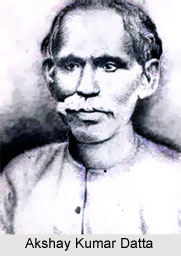 Akshay Kumar Datta was a famous Bengali writer who was amongst the pioneers of Bengal Renaissance. His name is also spelt as Akshay Kumar Dutta and he was born in the area of Chupi, Bardhaman, in the state of West Bengal, in the year 1820. His father was Pitamber Dutta.
Akshay Kumar Datta was a famous Bengali writer who was amongst the pioneers of Bengal Renaissance. His name is also spelt as Akshay Kumar Dutta and he was born in the area of Chupi, Bardhaman, in the state of West Bengal, in the year 1820. His father was Pitamber Dutta.
Early Life of Akshay Kumar Datta
Akshay Kumar Datta studied in Oriental Seminary, under the supervision of a man named Hardman Jeffroy. However, the sudden demise of his father compelled him to quit his education and seek jobs. This does not discourage him and he pursued his studies at the library of Sovabazar Rajbari, where he studied Geometry and Calculus. Akshay Kumar Datta mastered the languages of Persian and Sanskrit and learnt the Hindu scriptures in school. He practiced numerous other Indian languages and became proficient in foreign languages like German and French. The poetry book entitled `Anandamohan` was composed by Akshay Kumar Dutta when he was 14 years of age. Akshay Kumar Dutta used to translate news features for Ishwar Chandra Gupta`s newspaper, `Sambad Prabhakar` when he was a youngster. It is said that this great Bengali writer had also imbibed knowledge in the field of chemistry, botany and zoology in the Medical College.
Works of Akshay Kumar Datta
Akshay Kumar Datta associated himself with the Tattvabodhini Sabha and was appointed the assistant secretary in the year 1839. The next year, he was offered the designation of a teacher of the Tattwabodhini Pathsala, which he accepted. In 1843, Akshay Kumar Datta`s `Tattwabodhini Patrika` was published. This newsletter was considered to be a mouthpiece of the Brahmo Samaj and Tattwabodhini Patrika. Datta was the very first editor of this journal and he is known for his excellent contribution towards the growth of Bengali literature. He wrote books on the subjects of Bengali, Physics and Geography and worked for the propagation of a modern scientific approach. The other fields which interested this writer included mathematics, geology and astronomy. Akshay Kumar Datta was revered as the first man in the institution of Brahmo Samaj who strongly supported the logic behind the Vedas. He is believed to have persuaded Debendranath Tagore along these lines, which finally resulted in Brahmo Samaj adopting this principle which believed that the Vedas are not infallible. Thus influenced, Debendranath Tagore created his literary work named `Brahmo Dharma`.
Akshay Kumar Datta had to discontinue his gigantic work on Tattwobodhini Patrika due to his abrupt cerebral ailment. Besides his illness, Datta had theological and philosophical differences with Debendranath Tagore. Therefore, he left Tattwobodhini and worked as the Principal of the Normal School for teachers` training which was established by his mentor and friend, Ishwar Chandra Vidyasagar. Datta`s most celebrated work was `Bharatbarshiya Upasak Sampraday` which reflects his intense scientific knowledge and prowess in the field of philosophy. Rajendralal Mitra, Max Mueller and Monier-Williams were the various people who admired Akshay Kumar Datta.
This Bengali writer was greatly inspired by Isaac Newton, Charles Darwin, Francis Bacon, John Stuart Mill, Raja Ram mohan Roy, Auguste Comte and Thomas Henry Huxley. He had asserted that skepticism and atheism were significant elements of the entire Indian philosophy. He was a true agnostic and did not believe in religions, saying that they created adverse impact on the society. Other books written by Datta are `Dharmanit`, `Sahit Manabprakritir Sambandha Bichar`, `Padarthyabidya`, and `Charupath`.
Personal Life of Akshay Kumar Datta
Akshay Kumar Datta left a substantial amount for the Indian Association for the Cultivation of Science in his will.
Akshay Kumar Datta died on 18th May, 1886 at the age of 65. His grandson was the well-known Bengali poet Satyendranath Dutta. A few days after he passed away, a meeting was arranged at Bally, Howrah which discussed about how to immortalize this writer. However, despite all these efforts, he is remembered by very few people today.



















